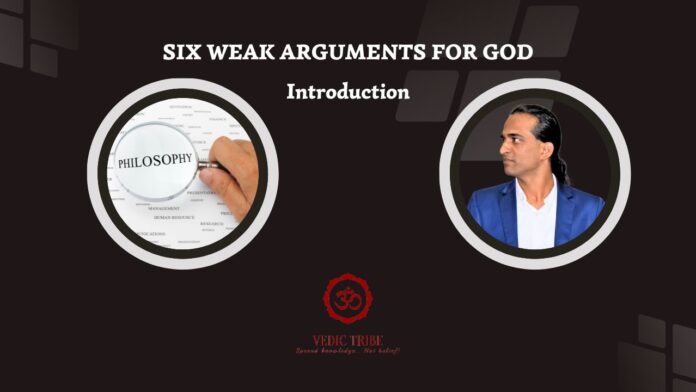Vedic approach:
In the Vedic tradition, the discussion on “God” emphasizes personal experience, intelligent inquiry, and inner exploration.
This approach offers a more comprehensive framework that involve sensory perception, logic & reasoning, and the shared experiences of enlightened beings.
These frameworks are constantly tested and refined by each generation through new discoveries. Arguments are refined and with the emergence of new generation of spiritual seekers all new perspectives are integrated.
Modern theistic approach in Abrahamic traditions:
The limitations: Abrahamic traditions have long relied heavily on “belief/faith” in messengers/messiahs. They faced challenges due to scientific discoveries that contradicted their narratives (e.g., age of the universe).
Failed reconciliation: Attempt to reconcile faith with science, have often led to “after-thoughts” and interpretations that are rejected by the academic community. For example, “Intelligent Design” argument relies on gaps in scientific knowledge to infer the existence of God. It’s considered weak because scientific advancements often fill these gaps, rendering the argument obsolete.
Yet, such arguments constantly attract attention in popular culture and some contemporary spiritual Gurus have also adopted such arguments.
A time-tested approach in Vedic culture:
Epistemology: The system of epistemology developed in Vedic tradition have stood the test of time and have incorporated all the developments in modern knowledge.
Integration: The Vedic tradition constantly incorporates insights from material advancements & new knowledge, continuously evaluates & improves the logical & philosophical underpinnings of beliefs. It accommodates, each generation of fresh perspectives, experiences, and interpretations to the ongoing dialogue about the divine.
Epistemology in Vedic tradition
Pratyaksha: Sensory perception has limitations – both biological and technological. Hence, it cannot perceive “nature” entirely, let alone “God”. Nonetheless, they are still considered important source of information – acting as supplementary to “subjective experience”.
Anumana: Logic and reasoning too have limitations. Logical arguments are built upon a foundation of premises or assumptions. Moreover, humans are susceptible to various fallacies in reasoning and they cannot answer questions on “subjective experience”. Hence they also act as supplementary to “subjective experience”.
Agama: The subjective experiences of Vedic Sages are canonized in Vedic literature and is further developed by the tradition since times immemorial. In Vedic tradition, the enquiry into these “subject experiences” only has the power to reveal the ultimate truth. Such an enquiry has to be essentially accompanied by information gathered via sensory perception and also logic & reasoning.
Subjective experience over logic & arguments:
While logic and reasoning are valuable tools, they are not considered as the primary means of attaining spiritual realization in the Vedic tradition. They are supplementary to personal experience, inner exploration, and the guidance of a qualified teacher.
Western attempts for reconciliation:
Many theistic individuals and groups in the west, seek to harmonize their religious beliefs with scientific understanding. This can stem from a desire to maintain both a strong faith and an acceptance of scientific evidence.
These are often ad hoc explanations created specifically to address perceived conflicts between faith and science. They can appear forced or contrived.
Vedic Tribe is happy to bring you this series, where selected six contemporary arguments for God are made in the western theistic tradition:
1. Observer God
2. God of gaps
3. Intelligent Designer God
4. Simulator God
5. Spinoza’s God
6. Panpsychist God
We aim to provide a holistic approach to spiritual growth, emphasizing the importance of both intellectual inquiry and inner exploration. We aim to cultivate curiosity and a thirst for knowledge in you, while reminding you that the ultimate truth lies beyond the realm of pure logic and reason.
In our next article, we will discuss a weak argument for God: “Observer God”
All the best.
Madhwesh K
Vedic Tribe

